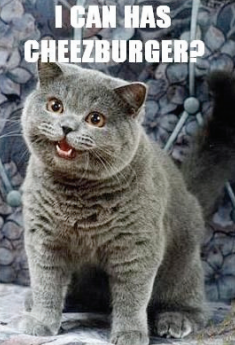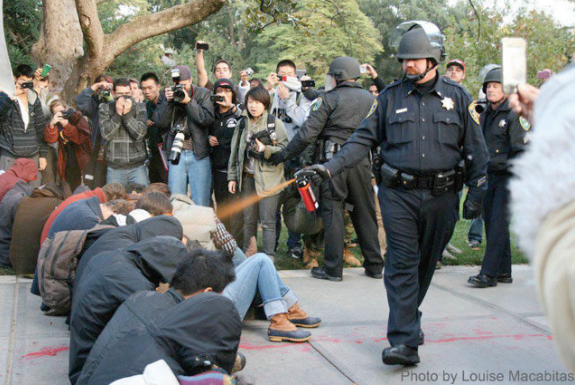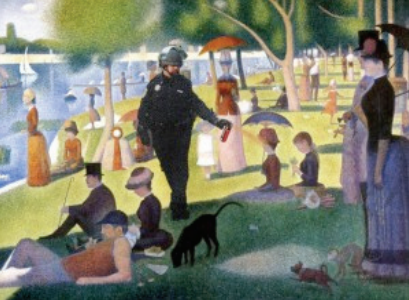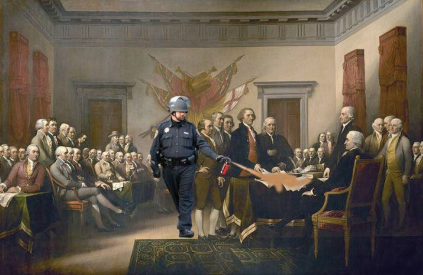Go back in time eight years.
A heavyset man named Gary Brolsma does a dance and lip-synch cover of the song "Dragostea Din Tei," by O-Zone, a Moldovan pop band. He wears a white and blue ringer t-shirt, pumps his ists in the air, and gives not the slightest care of who sees it. He then sends the video to his friends, who all know Gary as the class clown, so are unsurprised by the video. However, Gary gets the idea to post the video on the viral video sharing site, newgrounds.com.
Perhaps what spread Gary's dance video across the internet so quickly was the strange foreign song, or the imagery of a fat man moving quickly, or just the simple fact that Gary does not care who sees him dance like this, but in no time at all, Gary is an Internet Celebrity. What we have here is a viral video. However, when viewers create their own videos, imitating Gary's dance moves, and then post them to YouTube, an Internet Meme is born: "Numa Numa Guy" (the "numa numa" coming from the Moldovan lyrics in the song).1 Beginning with this example (albeit, a tad outdated but certainly recognizable as an infamous Internet Celebrity by all), allows deinitions to be established in the enormous world of Internet Culture; for while viral videos have existed through many different mediums and forms, the Internet Meme, a unit of online replication, is a specific object of the Internet that can play a role in identifying and demystifying the attitudes and values of Internet Culture.

Gary “Numa Numa Guy” Brolsma in mid-Numa
Somewhere in the lonely world of the Internets , most times late at night, procrastinating work of some sort, someone stumbles upon a silly, cute picture online. Often it is of an animal - someone's Welsh Corgi in a lobster Halloween costume, for example. Or perhaps an old video surfaces from the 1970s of a large Soviet man in a brown suit singing a nonsensical tune in front of a yellow backdrop. Maybe someone finds an awkward photograph of film actor Keanu Reeves sitting on a park bench, eating a sandwich, looking generally glum. The user who finds this image then modifies it in some way through Photoshop or other basic digital editing techniques and then shares it on internet messaging boards. The next morning, users who click the link to the manipulated photo laugh and enjoy the strange image. But many then use the original template photo to make their own images, posting and sharing them with each other. Soon, the silly modified images gains massive popularity on Facebook and Twitter, and eventually even print and television media outlets may discuss or incorporate them into their broadcasts. There may even be a spoof or reference to it on an episode of the television show Family Guy.
There is no doubt that these forms of entertainment, known as Internet Memes, are becoming more numerous and popular every day. The term Internet Meme derives from a study by zoologist Richard Dawkins in the 1970s of genetic evolution called The Selfish Gene. In it, Dawkins argued that compared to genetic evolution, which can take millennia to produce effects, the evolution of culture, especially within the last century, has progressed rapidly. Dawkins proposed that while genetic evolution depends on genes as modes of transmission, cultural evolution depends on what he called "memes." While Dawkins' work mainly centered around the idea of one of mankind's oldest memes, the God meme, the concept can be, and has been, applied to almost any aspect of culture. Just as each decade had its own memes - tie dye in the 70s, chia pets in the 80s, and Tickle-Me-Elmo in the 90s - Internet Memes also go in and out of popularity. Internet Memes, on the whole, are pieces of culture that evolve and are reproduced through means of Internet and web technology and that have an ability to spread and transform with bewildering speed. However, the approximate number of memes going through to the mainstream and commercial success, only to soon exit out the door of "selling out" is remarkably high. Observing and recording the evolution of memes allows us to comprehend the significance of what is presently the dominant form of entertainment in Internet Culture.
Yet, as this dominance roots itself mainly in Internet Culture, even if people have never heard the term, "Internet Meme," it is quite likely that they have at some point experienced one. Take what started as a weekly event known as "Caturday" on the message board site 4chan, where users would submit cute pictures of cats. Eventually, someone added text and created Lol Cats, a website that posted these photographs and added text in Lol Speak, a silly language based on instant messaging and cell phone texts that depends on intentional misspellings, discombobulated grammar, and humorous descriptions. Lol Cats then evolved into the online entertainment conglomerate Cheezburger (named after the supposed irst lol cat, "I Can Has Cheezburger?"), a group that owns over thirty different Internet Meme websites and garners on average almost one million views a week; indeed, it is consistently ranked as within the most popular 3,000 websites in the world (out of over 350,000,000).2

An example of a lol cat. Image courtesy of Cheezburger Network
While it may be impossible to quantify the amount of Internet Memes online (although resources such as knowyourmeme.com are doing an excellent job so far), it does become possible to qualify memes with a distinct artistic style. Memes have been rooted in Internet Culture since its earliest beginnings. However, they were not necessarily memes, but simply viral videos. Take for example any of the videos on YouTube of people slipping on a banana peel (7,440), jumping off a roof (10,700) or putting a tablespoon of cinnamon into their mouths, also known as the Cinnamon Challenge (31,000).3
These individual videos are not Internet Memes in the sense that I will use the term. They are viral videos. People watch them, are fascinated many times by a stupid action or decision that would be worthy of America's Funniest Home Videos, and, most importantly, they share them. Originally via email, now sharing has evolved to innumerable social media platforms such as Twitter, Facebook, and Tumblr. And while it may be argued that slipping on banana peels, jumping off of roofs, and choking yourself with spicy cinnamon are in fact memes in the way that Richard Dawkins and meme theorist Susan Blackmore may argue, since there are many different varieties of and imitations of these videos available, again, these individual videos are not Internet Memes.
Why? Because they lack character.
Once we are able to identify a wild Internet Meme, we can then group them together and compare their qualities, because surprisingly, for as many Internet Memes as there are, they do share similar characteristics. First and foremost, they are comedic objects. Their intention, for the most part, is laughter. How Internet Memes capture that laughter, however, is what makes Internet Memes unique, yet also extremely similar to other mediums. Internet Memes are short and based in images. Even in the case of popular videos like Numa Numa Guy, or the recent smash sensation of "Friday" by Rebecca Black, the Internet Meme is shared in either a screenshot of the video or a short GIF composed of several frames from the video. Internet Memes do not take long to create an effect: many times the punch-line can be delivered in under two seconds with less than 15 words. Other times, several memes can be arranged in a style of a webcomic, individual memes as the building blocks of the comic, and take longer to read.
The comedic functioning of Internet Memes can be traced back to their sphere of operation: Internet Culture. Consider the stereotypes of Internet Culture (and I hope to use these without offense, for I myself inhabited all of these one point): staying inside and playing video games or suring the web instead of playing sports; quiet and shy in reality but an avid anonymous commenter online; learning how software works and learning as much as possible from random internet sites; hot pockets. Internet Memes share the same cultural attitudes as Internet Culture.
Internet Memes work on commonalities, many of the memes are funny because they represent issues that we don't discuss in real life, but are more than happy to blab about online with a username. For example, memes use taboos of embarrassment (sharting, a term which means the combination of farting and defecating), taboos of self-mockery (the "forever alone" character represents all the significant other-less peoples of the Internet), and taboos of offense (Hitler is a common meme character, as well as characters that take items like rape or pedophilia and make them discussable topics such as Pedobear and Insanity Wolf). Yet, most memes can be categorized under the adjectives of cute, surreal, sublime, parodic/satirical, and absurd - everything from White People/First World Problems (an image of an upset crying woman with captions describing a problem of First World nations such as slow Internet), to Nyan Cat (a looping image of a cartoon cat with a pop-tart body flying through space and leaving a trail of rainbows).
What is essential to the lifespan of an Internet Meme, though, is in its imitations. As long as memes are being copied with new captions or different assemblages, the meme can survive. Therefore, an Internet Meme must constantly evolve to compete with the other memes constantly being released. Interestingly, the evolution of an Internet Meme can be compared to that of a film genre. Take the film Western, initially starting with true Westerns a la John Ford or Bonanza, then moving to a mainstream base, where everything is a Western, and eventually a combination of strange parodies and genre mashups, like Blazing Saddles or Cowboys vs. Aliens. Most memes will eventually become reflexive, either by making fun of their own shortcomings or commenting on other memes, thereby becoming meta-memes.
One possible path a meme can take, however, involves a jump into the mainstream. Internet Memes contain an important reciprocal relationship with mainstream popular culture, in that many Internet Memes depend on cultural references. (Godfather Baby). More often, it is an object from popular culture (say the Most Interesting Man in the World from Dos Equis commercials, or a scene from a film, such as Hitler reacting to Germany's army losing the war) that becomes an Internet Meme. Yet, on occasion, mainstream media (film, commercials, advertisements, etc.) attempt to make a meme proitable, which can work, but in most cases leads to backire and the inal death of the meme.
The 2006 film Snakes on a Plane is an example of Hollywood adapting to Internet Culture. After noticing massive interest online, the film was given a 5 day re-shoot to include lines from message boards and fan-made parody movies, including the infamous line "I've had it with these motherfucking snakes on this motherfucking plane," which would be ranked #55 on "The 100 Greatest Movie Lines" by Premiere in 2007.4 Also consider the "Bed Intruder Song," a song made by auto-tuning a news report about an attempted rape in Georgia. The song reached number 89 on the US Billboard Hot 100 and sold over 10,000 copies on iTunes on the irst two days of its release.5
What turns out to be the most controversial issue between Internet Culture and Mass Media, however, is the idea of ownership. A heated battle between Copyright Holders and Internet Users comes down to that simple idea: who owns what? Organizations like the Motion Picture Association of America and the Recording Industry Association of America have stated time and again that online piracy of movies and music is crippling the entertainment industry. This debate culminated to a point on January 18th, 2012, when websites like Wikipedia, Wired, Google, and Reddit participated in an online blackout protest to draw attention to two bills being discussed in Congress, the Stop Online Piracy Act and the Protect IP Act. The acts could possibly allow Internet censorship by copyright holders who saw their media used without their permission. The blackouts brought the bills to public light and caused a major media sensation.6
What needs to be considered on media possession in Internet Culture, though, is the differences between individual and collective ownership. When someone creates an Internet Meme, who owns that meme? Several owners could come and claim it: the anonymous uploader who added the captions around the image, the photographer who took the image and published it online, if it is a photoshop mash-up, it could be several photographers staking claims. This issue opens an entire collection of ideas related to legality, but in terms of the cultural theory in this article, it can be agreed that there is strong ambiguity in this ield.
As Internet Culture seeps its way into mainstream mass media every so often, between advertisements and specifically the Internet blackout protest, Internet Memes also contain the capacity for political commentary. On November 18th, 2011, a video was uploaded to YouTube showing UC Davis campus police pepper spraying a line of sitting protestors at close range on the campus's quad. Within a day, the video captured the public's attention, becoming a hot topic of debate in regards to the Occupy protests that started in early September of 2011 in New York City. During the tumultuous chaos and fallout from the incident, a manipulated photo appeared on the internet of Oficer John Pike spraying not the protestors, but America's founding fathers in John Trumbull's painting "Declaration of Independence" - or appearing in Georges Seurat's "A Sunday Afternoon on the Island of La Grande Jatte," spraying a woman with a parasol.

The original photograph from UC Davis.
Photo by Louise Macabitas
By November 22nd, only four days after the initial protesting, there were innumerable photoshopped images and four separate blogs solely dedicated to the meme collectively titled as "Pepper Spray Cop."7 ABC News, The Atlantic, the BBC, and The Wall Street Journal had all written articles about "Pepper Spray Cop." What makes this meme stick out is how amazingly fast it made its way into the mainstream and how closely related it is to current events. While seeing Pepper Spray Cop casually walk through famous paintings is quite humorous, other images showed him spraying the eyes of 1970 Kent State student Mary Vecchio (from John Filo's famous photograph) screaming over her fellow student's dead body.
Pepper Spray Cop has crossed the threshold of existing purely for entertainment's sake and into a new mode, exemplifying the flexibility of memes to shift between contexts and purposes easily. And perhaps at some level, as my research expands, it is this ability to be used in various ways and for various goals that makes Internet Meme Culture so important to internet and popular culture. It is in these uses that the study of memes merits such importance: their unique modes of creation and sharing in context of a shifting audience, coupled with their underground and mainstream contexts, signify a constantly growing structure of entertainment that could very well become a main component of western popular culture.

"A Sunday Afternoon on the Island of La Grande Jatte” by Georges Seurat, with Pepper Spray Cop.

“Declaration of Independence” by John Trumbull, with Pepper Spray Cop.
For Internet Memes to be considered a method of communication in Internet Culture, there must be some sort of basic unit in which coherent and universal sentences and thoughts can be constructed. I propose that this fundamental object of Internet Memes is the Advice Animal. An advice animal requires the following: a cropped image of an animal or human's face in the middle of a colorful background, the colors reflecting the theme at times of the general message of the advice animals. Text is layered above and below the face, usually above being the setup for a joke and below the punch-line. The original Advice Animal can be traced to Advice Dog in 2006, the face being a cute Labrador Retriever Puppy, the background rainbow pie slices, and the captions regarding bad advice, such as "Drink Motor Oil; Keep your engines running" and "Save money; Kill hookers." Spin-offs of Advice Dog include, Business Cat ("Get those reports to me; Right meow"), Philosoraptor ("What if Pinnochio said, 'My nose will now grow.'"), and Good Guy Greg ("Liked a band before they made it big; Doesn't go on about it"). Many of these Advice Dog memes do not entirely make sense in the same manner that its spin-offs do, but there is something worth taking a look at in its evolution.
I would like to briefly reiterate an earlier passage regarding the ambiguities of Internet ownership, the key question being, "Who owns an Internet Meme." A relatively recent trend in Internet Meme Culture is the creation of groups on Facebook that allow users to post Internet Memes that are specific to their organization, campus memes for college students populating the most pages. Take for example our own University of Pittsburgh's Internet Meme page, Pitt Memes. In it, users post about campus buildings, student groups, common annoyances, and the occasional current events. I myself created a meme based on the reoccurring phenomenon of certain students taking the usually crowded elevators in our 40 floor building, The Cathedral of Learning, to the third floor, an easily walkable three flights of stairs. Using a character titled "Y U NO Guy" I expressed my frustration with the caption "Take Cathedral elevators to 3rd floor; Y U NO take stairs!?"
While campus memes would supposedly help Internet Memes spread throughout general popular culture, there has been a certain amount of backlash within meme communities such as Reddit and 4chan, claiming that they are the creators of Internet Memes and these campus Facebook Pages abuse them. Abuse mainly means incorrectly using an Internet Meme. But perhaps this idea of ownership comes back into play. Take a general attitude of Internet Culture: exclusivity. How dificult is it to enter the world of online gaming without coming across the derogatory label for an uneducated beginner, "noob?" Perhaps you are unaware or at least ill-informed of the many values of Internet Culture, such as religion, popular culture, or current events. There are even Internet Memes that represent these outsiders to this collective Internet Culture society: Annoying Facebook Girl ("Complains about missing the 90s; Born in 1999) and First Day on Internet Kid ("Internet Explorer? That's me alright!"). Internet Memes are an exclusive type of communication; if you do not know how to use the correct meme, you will be excluded from the culture because you do not understand how they work.
With campus memes, this reverses the exclusivity, the now supposed originators of Internet Meme Culture unsure exactly what campus memes mean because they are not aware of the specific references to campus life. Perhaps because of this theft and reversal of language, it is the online meme communities that cry foul play and claim ownership on the memes. Because while an individual may forfeit ownership, albeit if they are anonymous, such as the uploader, or prominent, such as the photographer, the collective culture owns the media. Internet Culture owns Internet Memes, and perhaps this idea of ownership can then be applied to other heated areas of discussion in piracy and political copyright battles.
Internet Memes are the language of Internet Culture, and within that language we can see its attitudes and morals. Once the language is established, it becomes easier for the members to share opinions and tastes. As Internet Culture becomes stronger, encompassing more and more old medias into its own language while redeining cultural norms and beliefs, it strengthens the notion that Internet Culture could become the dominant form of mass popular culture eventually in our lifetime. Showing how versatile and political they can become allows theorists to determine the values of a new generation of Internet users through its language: Internet Memes. And hyperbolic it may be, we are coming closer to becoming so infused with Internet technologies through mobile devices and everyday interactions, that newborns are practically receiving iPads straight out of the womb. Even as Internet Culture through Internet Memes has the potential to grow enormously in size, though, I hope to distance myself from predictions and stay in the present, only to argue my point, that indeed, Internets are serious business.
Endnotes
1 http://www.xeornx.com/numanetwork/about.htm. Accessed January 23, 2012
2 www.alexa.com/siteinfo/icanhascheezburger.com. Accessed Nov. 28, 2011
3 Numbers taken from YouTube.com. Accessed March 12, 2012
4 www.imdb.com/title/tt0417148/. Accessed Nov. 28, 2011
5 http://www.wired.com/epicenter/2010/08/gregory-brothers-bed-intruder-ant.... Accessed Nov. 28, 2011
6 Wortham, Jenna. "A Political Coming of Age for the Tech Industry" New York Times. Accessed Mar. 20, 2012
7 soipeppersprayedthem.tumblr.com, fatcopwithpepperspray.tumblr.com, peppersprayingcop.tumblr.com, eatspray.tumblr.com. Accessed Nov. 24, 2011

